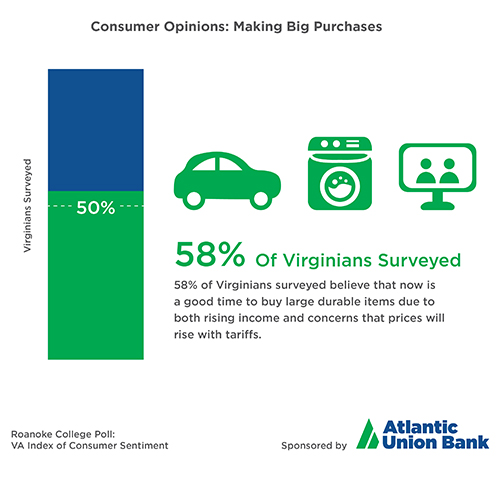Should you spend money now or save?
Maria Tedesco //October 24, 2019//
 Consumers across Virginia struggle with this question daily: “Do I buy this [insert expensive item you’ve had your eye on for months] now or wait to see if it goes on sale? Or wait to see if I get a bonus?” A recent consumer sentiment survey by Roanoke College shows consumers are leaning toward spending now instead of later because of uncertainty about prices increasing in the future.
Consumers across Virginia struggle with this question daily: “Do I buy this [insert expensive item you’ve had your eye on for months] now or wait to see if it goes on sale? Or wait to see if I get a bonus?” A recent consumer sentiment survey by Roanoke College shows consumers are leaning toward spending now instead of later because of uncertainty about prices increasing in the future.
Increased tariffs are driving up prices on consumer goods. On Sept. 1, the government imposed a 15% tariff on $109 billion in Chinese imports including footwear, clothing and consumer tech products like speakers, TVs and printers. The tariff increase could potentially rise again in the coming months if the disagreements between the two countries are not resolved. The next possible price hike would happen in December and include more consumer goods like smart phones, toys and video game consoles just in time for the big holiday season.
More than half (58%) of Virginia consumers surveyed believe that now is a good time to buy large durable items because of both rising income and concerns that prices will rise with tariffs. More than three quarters (81%) believe prices are going to increase in the next five to 10 years. Although we cannot predict whether or not these tariffs will in fact rise or in turn be lowered, some financial institutions have warned their clients that the tariff war could cost households approximately $1,000 annually.
Not sure about how you and your family should navigate these increasing prices and prepare your finances? Here are some tips and recommendations for why spending now could actually save you money down the road:
1. Make sure you have saved before you spend. Even though you should be considering making large purchases now before prices may rise, be sure to have money set aside for emergencies and refrain from using that money for these items. It's recommended that a family should have at a minimum three months’ worth of living expenses in your emergency fund.
2. Price vs. quality. In the case of purchasing large items, make sure you are purchasing these items based on quality. Ensure quality items such as a washer and dryer, kitchen appliances or a car include long life spans and are energy efficient to last longer and will not need to be replaced soon after buying.
3. Avoid impulse purchases. With any purchase, especially big-ticket items, employ the “24-hour rule.” This rule is important to follow for any purchase and allows you to consider the item and decide whether it is still a good idea to buy after waiting 24 hours. You can come out of this waiting period confident that it is a solid purchase or that you should wait.
Be sure to follow these three tips when considering making large purchases in the midst of economic uncertainty or visit your local bank to discuss your finances with a knowledgeable financial adviser. As always, do not purchase the first big ticket item you come across or actually do not need. Discuss financial decisions with your partner and make sure the purchase is the correct one for your needs and future.
 Maria Tedesco is the president of Atlantic Union Bank, the first statewide Virginia-based regional bank in over 20 years. Recently, Atlantic Union Bank was named No. 1 in customer satisfaction with retail banking in the Mid-Atlantic region by J.D. Power. In 2012 and 2017, Tedesco was named one of the most powerful women in banking by American Banker.
Maria Tedesco is the president of Atlantic Union Bank, the first statewide Virginia-based regional bank in over 20 years. Recently, Atlantic Union Bank was named No. 1 in customer satisfaction with retail banking in the Mid-Atlantic region by J.D. Power. In 2012 and 2017, Tedesco was named one of the most powerful women in banking by American Banker.

















